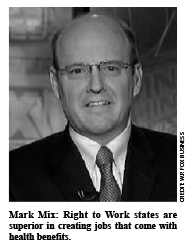Is This Any Way to Run a City’s Schools?
Leaked CTU Proposals Won’t Do Anything to Improve Schools’ Poor Performance
Since 2003, Coverage Down By 2.12 Million in Forced-Dues States
(Click here to download the April 2015 National Right to Work Newsletter)
Big Labor’s allies sometimes concede that states with Right to Work laws, which bar the firing of employees for refusal to pay dues or fees to their “exclusive” (monopolistic) union bargaining agents, enjoy accelerated job creation.
 Whenever forced-unionism apologists do make this concession, they insist the jobs created in Right to Work states are “the wrong kind.”
Whenever forced-unionism apologists do make this concession, they insist the jobs created in Right to Work states are “the wrong kind.”
But the fact is, it is in the non-Right to Work states as a group where new jobs are more typically not productive enough to come with important benefits like health insurance.
Runaway costs associated with Medicare and Medicaid, the two largest taxpayer-funded health-insurance programs, are helping to bust the federal budget and put many state governments deep in the red.
The so-called “Affordable Care Act” of 2010, otherwise known as ObamaCare, was sold in part on the theory that it would help stop Medicare and Medicaid costs from spiraling out of control.
Even at the time of ObamaCare’s enactment, it seemed extraordinarily unlikely this promise would be fulfilled. Today the odds are slimmer still.
Private Health Coverage Expanded by 3.1% in Right to Work States in 2013 Alone
“Clearly, the accelerated creation of good jobs that are sufficiently productive to absorb the high cost of family health-care benefits remains a key component for resolving the Medicare and Medicaid crises,” observed Mark Mix, president of the National Right to Work Committee.
“Sadly, millions and millions of such jobs were destroyed throughout the country during the Great Recession of 2007-2009.
“Since then, however, despite the tepid national recovery, private insurance has bounced back vigorously in many, though far from all, states.”
In 2013 alone (the most recent year for which data are now available), Right to Work states as a group (then 24 in number) enjoyed a net increase of 2.66 million, or 3.1%, in the number of people covered by private health insurance.
That’s roughly quadruple the overall percentage increase for the 26 states that at that time did not protect employees from federally-imposed compulsory unionism.
(Wisconsin, which did not become the 25th Right to Work state until this year, is counted as forced-unionism in all the calculations in this story.)
Right to Work Advantage No Mere One-Year Anomaly
“Right to Work states’ superiority in creating jobs that come with health-insurance benefits is no mere one-year anomaly,” said Mr. Mix.
Over the past decade for which data are available (2003-2013), despite the enormous setback of the Great Recession, Right to Work states as a grou p added roughly 3.74 million people, net, to the ranks of the privately insured.
p added roughly 3.74 million people, net, to the ranks of the privately insured.
Meanwhile, forced-unionism states saw their ranks of privately insured people shrink by 2.12 million.
(Indiana and Michigan, which enacted the 23rd and 24th state Right to Work laws, respectively, in 2012, are excluded from the calculations in the preceding two paragraphs.)
Had private insurance coverage increased in forced-unionism states as much as it did in Right to Work states over the past decade, there would have been roughly 10 million more people with private insurance nationwide in 2013 than the actual figure of 210 million.
“Where forced dues are legal, union bosses use their power to dislocate labor markets, jack up costs, and bankroll Tax & Spend, regulation-happy politicians,” explained Mr. Mix.
“The evidence indicates fewer jobs that pay well and offer good benefits are created as a consequence.
“And, when it comes to the private sector, Congress spawned the problem of compulsory unionism. Among the millions of private-sector workers who are forced to pay union dues to keep their jobs, not one is forced to do so by a state law.
“Congress instigated the moral evil of forced unionism and the economic ills it brings. It’s Congress’s responsibility to correct its mistake.”

Leaked CTU Proposals Won’t Do Anything to Improve Schools’ Poor Performance

Wherever Big Labor wields the power to collect forced union dues, union bosses funnel a large share of the confiscated money into efforts to elect and reelect business-bashing politicians. Employment growth tends to lag as a consequence.

Members Insist They Keep Pro-Right to Work Campaign Promises